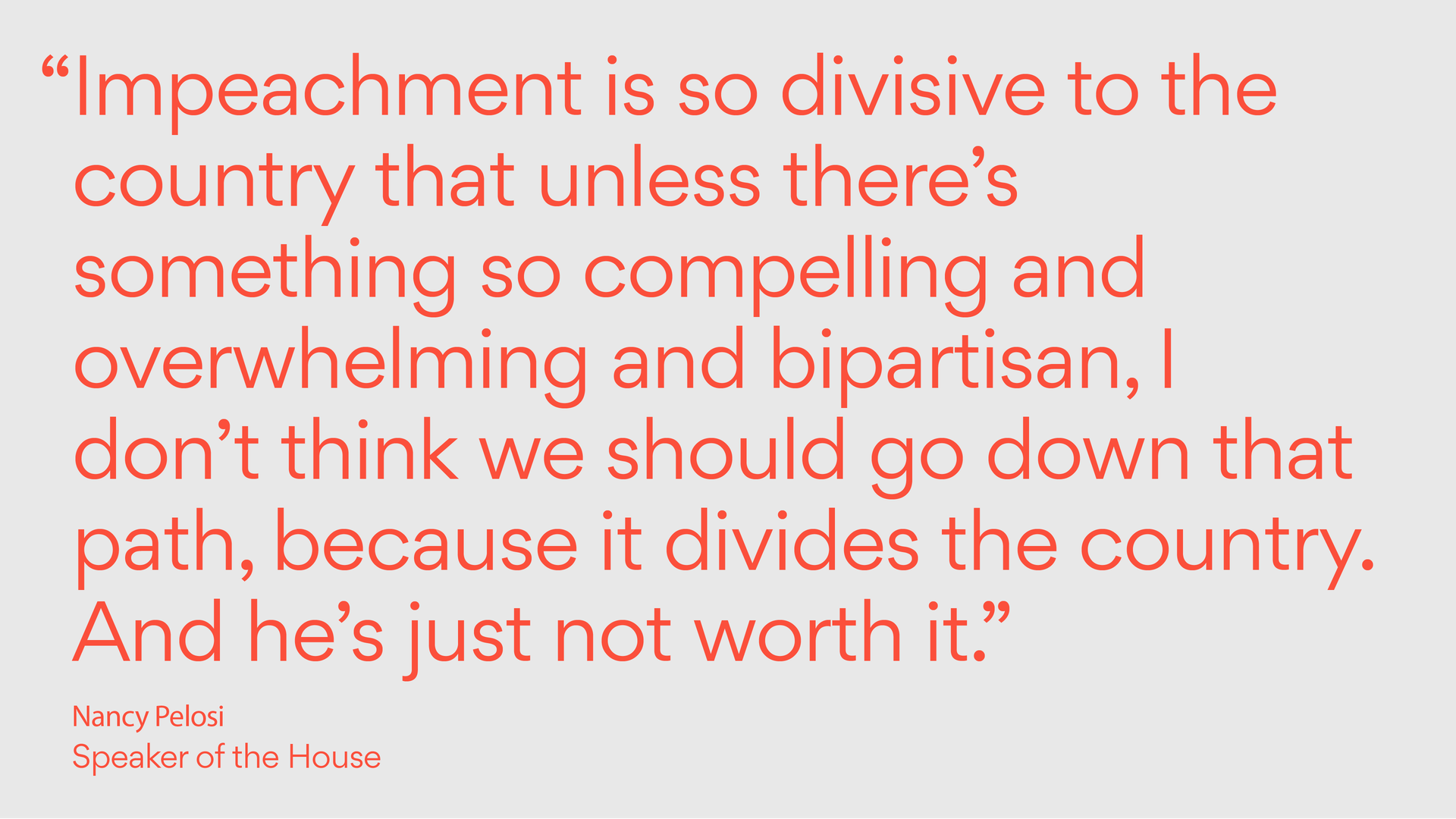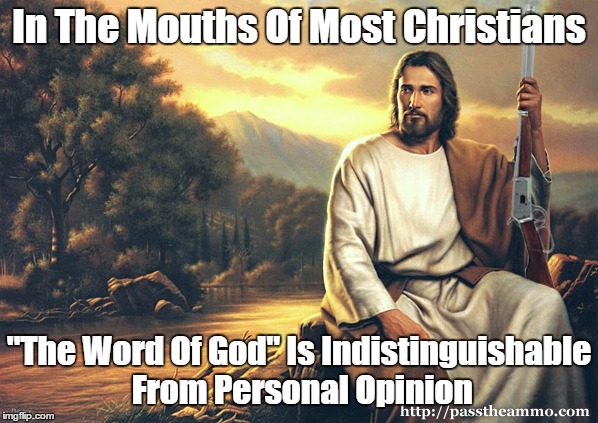
There’s a Bigger Prize Than Impeachment
Keeping Trump in office will destroy the Republican Party.
By Joe Lockhart
Mr. Lockhart served as White House press secretary from 1998 to 2000.
In the fall of 1998, Erskine Bowles, the White House chief of staff, traveled to Capitol Hill to meet with the speaker of the House. Mr. Bowles enjoyed a better relationship with Speaker Newt Gingrich than anyone in the Clinton White House, partly based on a shared Southern
heritage and commitment to fiscal conservatism. At the end of the meeting, Mr. Bowles put a very direct question to Mr. Gingrich: Why were the Republicans intent on impeaching Bill Clinton? The speaker replied, “Because we can.”
I had a front-row seat and a small speaking role in the political drama that followed. Now, as the country is gripped by another impeachment debate, many are comparing the two scandals and handicapping what the Democrats might do.
Just as Speaker Gingrich did in 1998, Speaker Nancy Pelosi could direct the impeachment of President Trump because she can. Unlike in 1998, she stands on firmer ground: The Clinton case involved an egregious personal mistake and purported steps to cover it up; the Trump case involves an
effort to thwart an investigation into a foreign attack on our
democratic system.
Inevitably the news media and the political chattering class, of which I count myself as a card-carrying member, have focused on the party politics of impeachment. With the benefit of hindsight, impeaching President Clinton was a disaster for the Republicans. Mr. Clinton’s job approval was at a record 73 percent the month he was impeached,
Democrats defied the odds and picked up seats in the midterm elections
and Mr. Gingrich returned to the private sector.
Impeaching Bill Clinton was wholly a political decision; the substance mattered little in 1998. Two decades later, Democrats face almost the exact opposite dynamics.
For Democrats, leaving Donald Trump in office is not only good politics — it is the best chance for fundamental realignment of American politics in more than a generation. Mr. Trump is three years into destroying what we know as the Republican Party. Another two years just might finish it
off. Trumpism has become Republicanism, and that spells electoral doom for the party.
Mr. Trump has abandoned most of the core principles that have defined Republicans for the past century. Free trade abandoned for protectionism. Challenging our adversaries and promoting democracy replaced by coddling Russia and cozying up to dictators near and far. Fiscal conservatism replaced by reckless spending and exploding deficits.
What’s left of the party is a rigid adherence to tax cuts, a social agenda that repels most younger Americans and rampant xenophobia and race-based politics that regularly interfere with the basic functioning of the federal government.
Republicans today are the party of Rush Limbaugh, Sean Hannity and Tucker Carlson — a coalition that, in the face of every demographic trend in America, will mean the long-term realignment of the federal government behind the Democrats.
We’re not quite there yet — but keeping President Trump in office is the best way to cement Trumpism’s hold on the Republican Party.
Republicans themselves know it, and that simple fact is a huge problem for them: By and large they don’t like him, and they know he’s a long-term problem for the party — but in the short term they know they can’t get re-elected without his voters. For Democrats, it’s the dream scenario — as long as he completes his term.
President Trump should be impeached because he is unfit for the presidency. He represents a clear and present danger to our national security. We didn’t need Robert Mueller’s report for that. But if Newt Gingrich taught us anything, impeaching the president is likely to be bad politics.
Nothing will unite an increasingly fraying Republican Party more than trying to remove the president anywhere but at the ballot box. Democrats risk the kind of overreach that doomed the Republicans 20 years ago. And in any case Democrats are not likely to succeed in getting votes in the Senate to convict the president. And in politics, a loss is a loss —
there are no moral victories.
I fully understand the historical imperative of holding the president accountable for his behavior. I also share the sentiment of so many Americans who want to punish him for what he’s done to the country. But I believe there is something bigger at stake.
Allowing Mr. Trump to lead the Republican Party, filled with sycophants and weak-willed leaders, into the next election is the greater prize. Democrats have a once-in-a-lifetime opportunity to realign American politics along progressive lines, very much like Ronald Reagan did for
Republicans in the 1980s.
Trumpism equals Republicanism as long as Donald Trump is at the top of the ticket. And a real shift to progressivism in America will be delivered by a devastating rebuke of the president and his party, a rebuke that will return control of the Senate and state houses across the nation. Politics is always a gamble — and this is the best bet we’ve had in a long time.
By Joe Lockhart
Mr. Lockhart served as White House press secretary from 1998 to 2000.
In the fall of 1998, Erskine Bowles, the White House chief of staff, traveled to Capitol Hill to meet with the speaker of the House. Mr. Bowles enjoyed a better relationship with Speaker Newt Gingrich than anyone in the Clinton White House, partly based on a shared Southern
heritage and commitment to fiscal conservatism. At the end of the meeting, Mr. Bowles put a very direct question to Mr. Gingrich: Why were the Republicans intent on impeaching Bill Clinton? The speaker replied, “Because we can.”
I had a front-row seat and a small speaking role in the political drama that followed. Now, as the country is gripped by another impeachment debate, many are comparing the two scandals and handicapping what the Democrats might do.
Just as Speaker Gingrich did in 1998, Speaker Nancy Pelosi could direct the impeachment of President Trump because she can. Unlike in 1998, she stands on firmer ground: The Clinton case involved an egregious personal mistake and purported steps to cover it up; the Trump case involves an
effort to thwart an investigation into a foreign attack on our
democratic system.
Inevitably the news media and the political chattering class, of which I count myself as a card-carrying member, have focused on the party politics of impeachment. With the benefit of hindsight, impeaching President Clinton was a disaster for the Republicans. Mr. Clinton’s job approval was at a record 73 percent the month he was impeached,
Democrats defied the odds and picked up seats in the midterm elections
and Mr. Gingrich returned to the private sector.
Impeaching Bill Clinton was wholly a political decision; the substance mattered little in 1998. Two decades later, Democrats face almost the exact opposite dynamics.
For Democrats, leaving Donald Trump in office is not only good politics — it is the best chance for fundamental realignment of American politics in more than a generation. Mr. Trump is three years into destroying what we know as the Republican Party. Another two years just might finish it
off. Trumpism has become Republicanism, and that spells electoral doom for the party.
Mr. Trump has abandoned most of the core principles that have defined Republicans for the past century. Free trade abandoned for protectionism. Challenging our adversaries and promoting democracy replaced by coddling Russia and cozying up to dictators near and far. Fiscal conservatism replaced by reckless spending and exploding deficits.
What’s left of the party is a rigid adherence to tax cuts, a social agenda that repels most younger Americans and rampant xenophobia and race-based politics that regularly interfere with the basic functioning of the federal government.
Republicans today are the party of Rush Limbaugh, Sean Hannity and Tucker Carlson — a coalition that, in the face of every demographic trend in America, will mean the long-term realignment of the federal government behind the Democrats.
We’re not quite there yet — but keeping President Trump in office is the best way to cement Trumpism’s hold on the Republican Party.
Republicans themselves know it, and that simple fact is a huge problem for them: By and large they don’t like him, and they know he’s a long-term problem for the party — but in the short term they know they can’t get re-elected without his voters. For Democrats, it’s the dream scenario — as long as he completes his term.
President Trump should be impeached because he is unfit for the presidency. He represents a clear and present danger to our national security. We didn’t need Robert Mueller’s report for that. But if Newt Gingrich taught us anything, impeaching the president is likely to be bad politics.
Nothing will unite an increasingly fraying Republican Party more than trying to remove the president anywhere but at the ballot box. Democrats risk the kind of overreach that doomed the Republicans 20 years ago. And in any case Democrats are not likely to succeed in getting votes in the Senate to convict the president. And in politics, a loss is a loss —
there are no moral victories.
I fully understand the historical imperative of holding the president accountable for his behavior. I also share the sentiment of so many Americans who want to punish him for what he’s done to the country. But I believe there is something bigger at stake.
Allowing Mr. Trump to lead the Republican Party, filled with sycophants and weak-willed leaders, into the next election is the greater prize. Democrats have a once-in-a-lifetime opportunity to realign American politics along progressive lines, very much like Ronald Reagan did for
Republicans in the 1980s.
Trumpism equals Republicanism as long as Donald Trump is at the top of the ticket. And a real shift to progressivism in America will be delivered by a devastating rebuke of the president and his party, a rebuke that will return control of the Senate and state houses across the nation. Politics is always a gamble — and this is the best bet we’ve had in a long time.


































